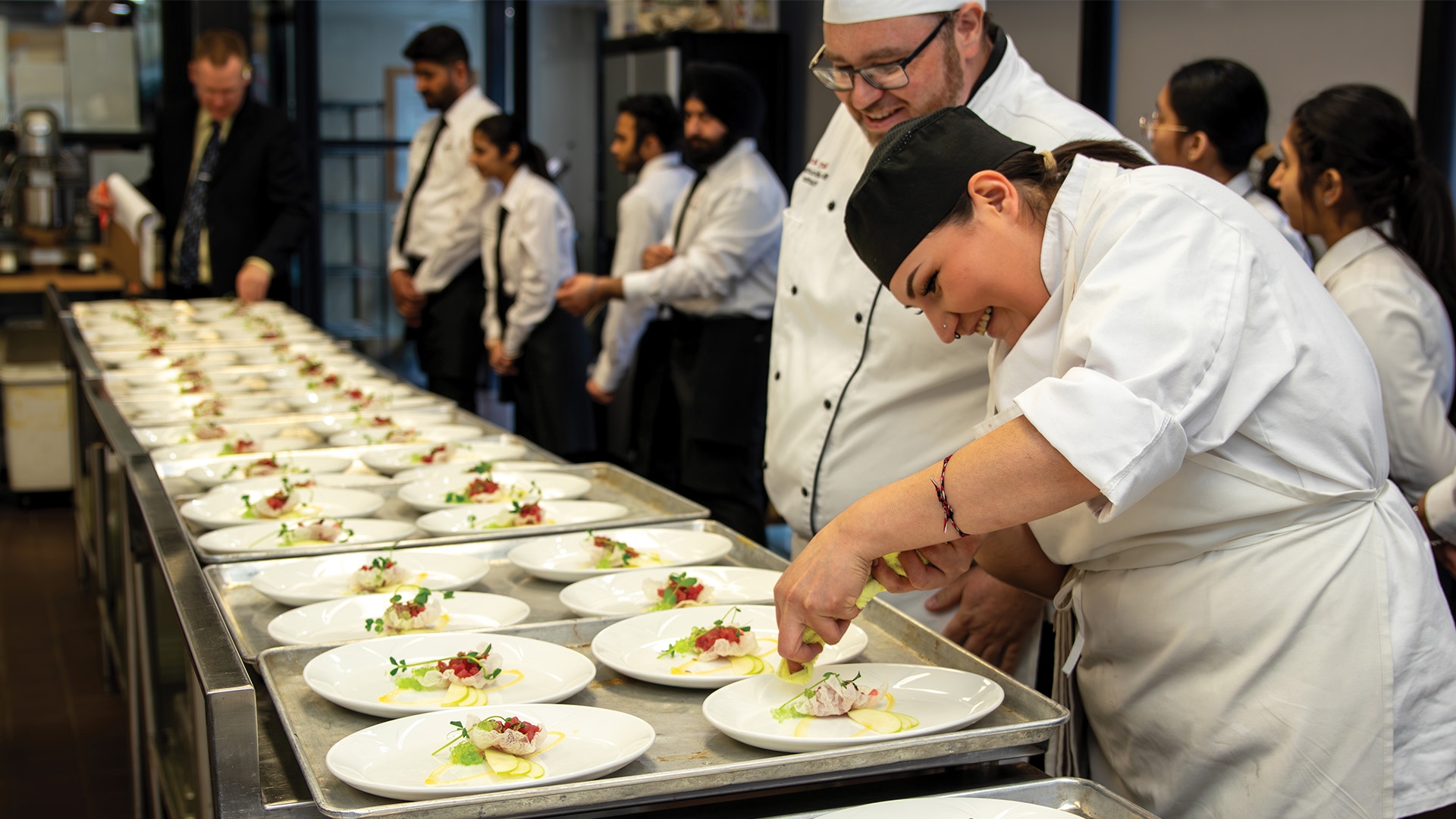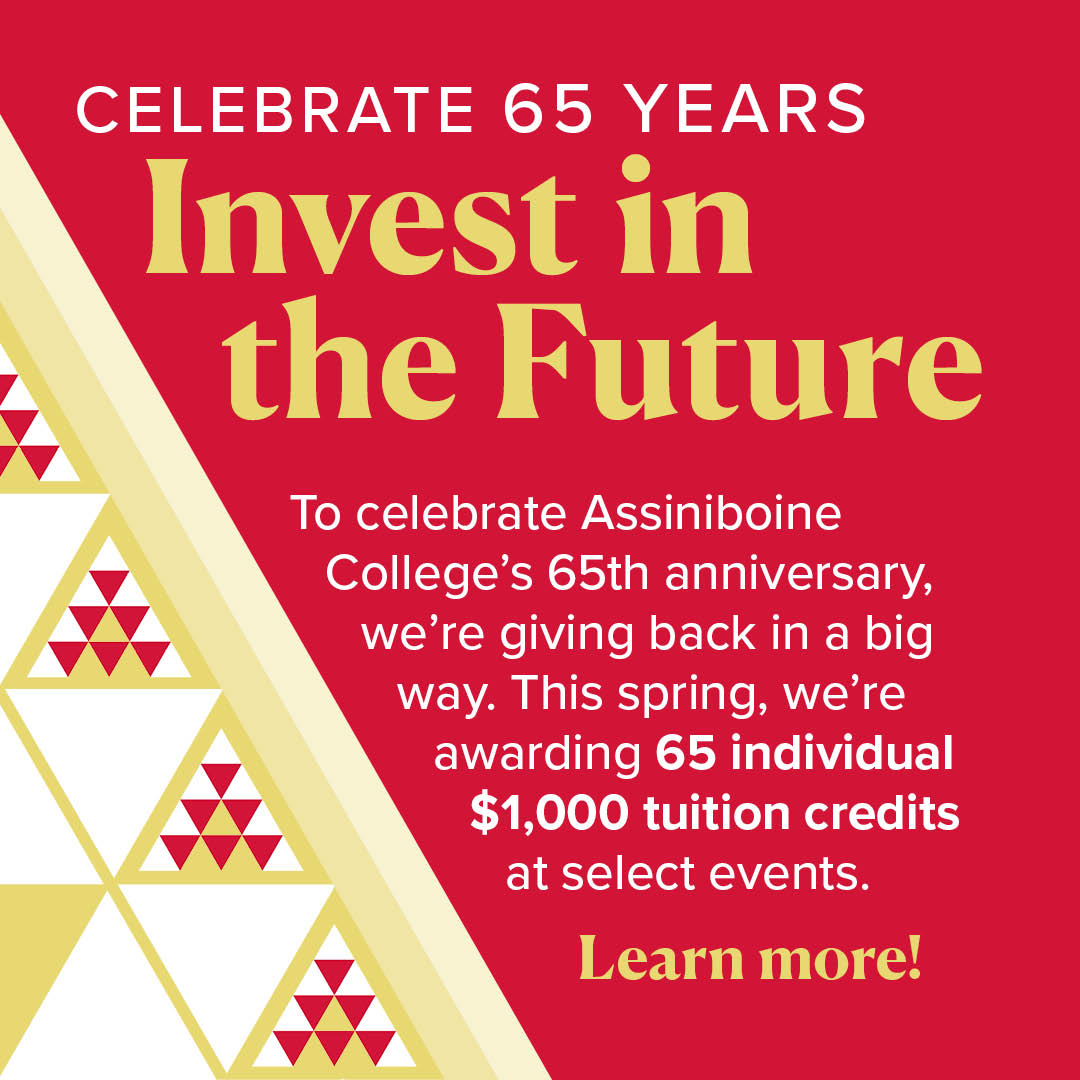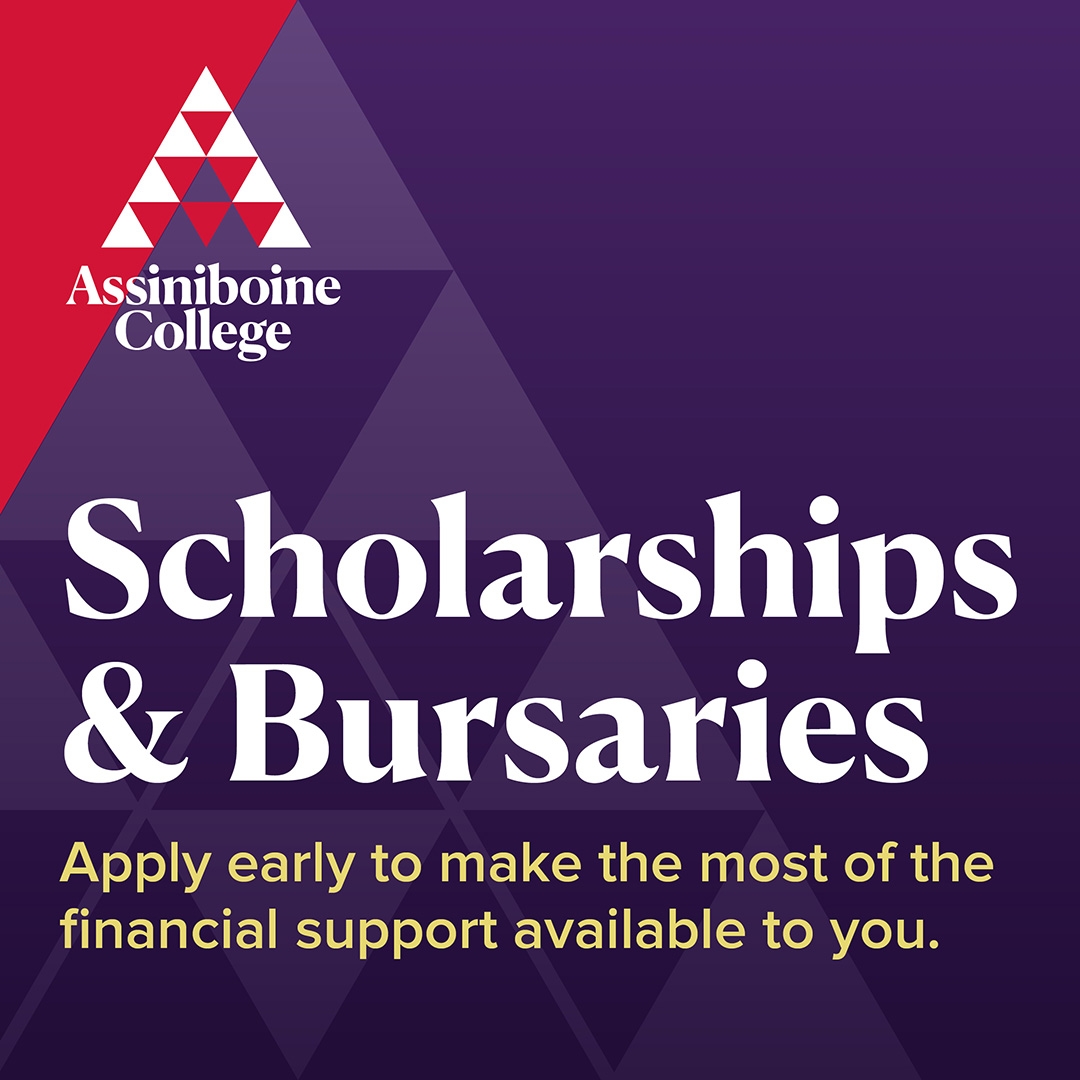Culinary Arts
Overview
Assiniboine’s two-year Culinary Arts diploma program focuses on providing the skills and experiences needed to immediately begin working in rewarding careers in the food industry.
Areas of specialization vary according to where the cook or chef is employed and the level of education achieved. Entry-level positions as a cook or chef apprentice can be sought after graduation from the two-year Culinary Arts diploma; students are granted apprenticeship credits from their training and experiences in the program toward achieving a Red Seal Chef designation.
Program Learning Outcomes
- Graduates are able to provide advanced culinary preparation and presentation for a variety of food service environments using a range of classical and contemporary techniques.
- Apply food and bake science to food preparation to create a desired end product.
- Contribute to and monitor adherence of others to the provision of a well-maintained kitchen environment and to the service of food and beverage products that are free from harmful bacteria or other contaminants, adhering to health, safety, sanitation and food handling regulations.
- Ensure the safe operation of the kitchen and all aspects of food preparation to promote healthy workspaces and the responsible, efficient use of resources.
- Create menus that reflect knowledge of nutrition and food ingredients, promote general health and well-being, respond to a range of nutritional needs and preferences and address modifications for special diets, food allergies and intolerances, as required.
- Apply fundamental business principles and recognized industry costing and control practices to food service operations to promote a fiscally responsible operation.
- Apply basic knowledge of sustainability, ethical and local food sourcing, and food security to food preparation and kitchen management, recognizing the potential impacts on food production, consumer choice and operations within the food service industry.
- Use technology, including contemporary kitchen equipment, for food production and promotion.
- Perform effectively as a member of a food and beverage preparation and service team and contribute to the success of a food-service operation by applying self-management and interpersonal skills.
- Develop strategies for continuous personal and professional learning to ensure currency with and responsiveness to emerging culinary techniques, regulations, and practices in the food service industry.
- Contribute to the development of marketing strategies that promote the successful operation of a food service business.
- Contribute to the business management of a variety of food and beverage operations to foster an engaging work environment that reflects.
Examples of jobs graduates from this program can do:
Cooks are generally employed in the hospitality and tourism sector (for example in restaurants, hotels, resorts, catering establishments, country clubs and aboard ships) or in institutional settings (for example: hospitals, nursing homes, educational institutes, correctional facilities, camps and military bases). Entry-level positions as a cook can be sought after one year of the Culinary Arts program.
Examples of what chefs and specialist chefs do (following two years of study):
- Prepare and cook complete meals or specialty foods, such as pastries, sauces, soups, salads, vegetables and meat, poultry and fish dishes, and create decorative food displays for special events such as banquets.
- Instruct cooks in preparation, cooking, garnishing and presentation of food.
- Create new recipes.
- Supervise cooks and other kitchen staff.
- May plan menus, requisition food and kitchen supplies.
- Examples of duties executive chefs perform (following two years of study):
- Plan and direct food preparation and cooking activities of several restaurants in an establishment, restaurant chains, hospitals or other establishments with food services.
- Consult with clients regarding weddings, banquets and specialty functions.
- Plan menus and ensure food meets quality standards.
- Estimate food requirements and may estimate food and labour costs.
- Supervise activities of sous-chefs, specialist chefs, chefs and cooks.
- Arrange equipment purchases and repairs.
- Recruit and hire staff.
- May prepare and cook food on a regular basis, or for special guests or functions.
Examples of what cooks do (following one year of study):
- Prepare and cook complete meals or individual dishes and foods.
- Prepare and cook special meals for patients as instructed by the dietitian or chef.
- Schedule and supervise kitchen helpers.
- Oversee kitchen operations.
- Maintain inventory and records of food, supplies and equipment.
- May set up and oversee buffets.
- May clean kitchen and work area.
- May plan menus, determine the size of food portions, estimate food requirements and costs, and monitor and order supplies.
- May hire and train kitchen staff.
- Cooks may specialize in preparing and cooking ethnic cuisine or special dishes.
Success Factors
You might be a good fit for this program if you would enjoy:
- Cooking and experimenting in the kitchen.
- An opportunity to learn from and interact with different Chef Instructors and exposure to a variety of worldviews, techniques, and culinary styles.
- Using your creativity, your keen sense of taste and smell, and your interest in precision work.
- Using your organizational skills and ability to multitask.
- A physically demanding occupation that involves rapid problem-solving and critical thinking.
- Working in a collaborative team environment.
- Continually learning and adapting to changing conditions in a fast-paced environment.
- Being versatile enough to assist with any task that needs doing within the kitchen.
- A customer service focus.
The industry and program environment require individuals to:
- Work shift work, including early mornings, late evenings, holidays and weekends, and the number of hours worked each week varies depending on the type of position and assignment or establishment.
- Participate in live restaurant and event operations during the program which falls outside of the typical day schedule and includes early mornings, evenings and weekend hours.
- Work with alcohol, meat, and a variety of culinary traditions.
- Work under a great deal of pressure to provide quick and quality service.
- Have physical strength and stamina as well as mobility and motor skills to undertake the required tasks.
- Groom and dress according to industry expectations.
- Develop good habits and discipline, arrive on time, in a clean uniform, and ready to work.
Interested in exploring similar program options?
We've got you covered! Here are some other great program options to consider.
Admissions
Admission Requirements
- A complete Manitoba Grade 12 or equivalent
- English 40G/40S or equivalent
- Consumer/Essential Mathematics 40S or equivalent
If you received your education outside of Manitoba, please review the equivalent admission requirements: Interprovincial or International.
English is the language of instruction at Assiniboine. All applicants educated outside of Canada or in a country not on the test exempt list are expected to meet the English language proficiency requirements.
READY TO TAKE THE NEXT STEP IN YOUR EDUCATION JOURNEY?
Start your online application today and join Assiniboine College! View the Culinary Arts program application checklist for further details and get a better understanding of the admission requirements.
DON'T MEET ADMISSION REQUIREMENTS?
If you don’t meet admission requirements, visit our Centre for Adult Learning to upgrade courses.
Program Considerations
Program requirements include participating in live restaurant and event operations outside of the typical day schedule and include early mornings, evenings and weekend hours. Alcohol and a variety of culinary traditions are part of the program.
Careers & Connections
Career Opportunities
- Hotels
- Restaurants
- Resorts
- Institutional kitchens
- Catering companies
Connections
Graduates who register as an apprentice within two years of completing the program may be granted credit for both Level 1 and Level 2 cook in-school technical training.
Assiniboine has a number of agreements with other colleges, universities and professional organizations, making it possible to apply credit taken at Assiniboine to programs at other institutions. For information on agreements, see Articulation Agreements.
Upon completion of this program, graduates will have the following certifications:
- First Aid
- FoodSafe
- Smart Choices
- Workplace Hazardous Materials Information System (WHMIS)
- Fire Safety
Tools & Supplies
This program features a state-of-the-art teaching kitchen, elegant Great Grey Owl dining room and culinary theatre all located in the beautiful heritage building shared with the Hotel and Restaurant Management program. Together these students gain hands-on experience by hosting a variety of events that are open to the community.
Culinary Arts is a very practical program in which many skills are developed in the kitchen. With the large component of applied learning, the cost of textbooks is very minimal.
Culinary Arts students benefit from hands-on experience researching and planning menus, preparing for buffets, banquets, festivals and educational events, exploring distinctive ingredients and culinary styles, and using state-of-the-art equipment and novel techniques.
Program Checklists, Textbooks, and Supplies
ASSINIBOINE BOOKSTORE
Textbooks, supplies and uniforms may be purchased at the Assiniboine Bookstore at the Victoria Avenue East Campus. Booklists are available from your school office 30 days prior to the start date of your program.
Technology Requirements
Students in this program are required to bring their own laptop for use on-campus. The laptop must meet the technical needs outlined by the program. See Technology Requirements for detailed information.
Courses & Costs
Costs
Estimated Program Costs (Domestic students)
| Year 1 | Year 2 | |
|---|---|---|
| Credits | 60.0 | 66.0 |
| Tuition | $4,010 | $4,020 |
| Course Fees | $2,260 | $2,460 |
| Students' Association fees (including Health Premium) | $580 | $600 |
| Estimated textbooks, tools, and supplies | $1,540 | $900 |
All fees are estimated and subject to change without notice.
Estimated Program Costs (International students)
| Year 1 | Year 2 | |
|---|---|---|
| Credits | 60.0 | 66.0 |
| Tuition | $16,440 | $17,690 |
| Course Fees | $2,260 | $2,460 |
| Students' Association fees (including Health Premium) | $580 | $600 |
| Required Health Insurance | $750 | $750 |
| Estimated textbooks, tools, and supplies | $1,540 | $900 |
All fees are estimated and are subject to change without notice. All international students must purchase health insurance. The college adds this fee to your student account and then sends your name and fee to the insurance provider on your behalf.
For more information, visit the Fees and Charges page.
Courses
To graduate with a Culinary Arts diploma, students must successfully complete 126 credits. The minimum passing grade for each course is indicated on the course outline. Course offerings are subject to change and may vary by intake.
Year One Courses
| Title | Credits/CEUs | Elective | Distance | PLAR |
|---|---|---|---|---|
1st Aid - Emergency (HLTH-0030)Basic First Aid and CPR techniques taught in an interactive environment for individuals and employees who want an overview of First Aid and CPR in the workplace or home. The course covers skills needed to recognize, prevent and respond to cardiovascular emergencies for adults, CPR and other topics such as choking, airway and breathing emergencies, and prevention of disease transmission. This course meets the minimum regulations for Workplace Health and Safety for Basic First Aid. Participants who meet the required standard receive a nationally recognized certification that is valid for three years. |
0 credit(s) | No | No | No |
Breakfast Cookery (COOK-0004)This course includes basic preparation, cooking and serving of egg dishes and breakfast items for an a la carte menu as well as for a buffet. This course also includes related dairy products. |
3 credit(s) | No | No | No |
College Foundations (PEDV-0356)This course improves students' ability to navigate the college experience and environment, including student's rights, roles, and responsibilities. In this course, students reflect on their skills, attitudes, and expectations and develop learning strategies to help them to become successful, resilient, and self-directed learners. The course covers topics such as success in online learning, time management strategies, learning strategies, assessment taking strategies, academic integrity, information and digital literacy, and wellness, among others. It integrates elements of student orientation. |
0 credit(s) | No | No | No |
Cooking Fundamentals (COOK-0079)This course provides an overview of the cooking profession and the food service industry. It includes information on sanitation, safety, Workplace Hazardous Materials Information System (WHMIS), first aid and safe food handling. |
6 credit(s) | No | No | No |
Cooking Principles (COOK-0080)This course provides information and practical experience on how to follow a recipe, use seasonings and flavours, as well as perform mise en place. The importance of basic nutrition is highlighted. |
3 credit(s) | No | No | No |
Culinary Applications 1 (COOK-0081)This course includes student participation in special projects and functions with closely supervised guided learning. Projects are chosen to match the abilities of year one students. The learner rotates through several stations to develop the skills, techniques, knowledge and critical thinking experience necessary to succeed in industry. |
6 credit(s) | No | No | No |
Culinary Skills (COOK-0082)Prerequisites: COOK-0014 FoodSafe 1, COOK-0079 Cooking Fundamentals |
3 credit(s) | No | No | No |
Fire Safety (WRKP-0021)This awareness seminar is provided by the City of Brandon Fire Department. Participants learn to identify various fire types and understand their individual characteristics. Fire hazard identification and fire safety procedures are demonstrated in relation to food service operations. Participants learn the functions of a fire extinguisher, coupled with a practical learning exercise demonstrating proper handling and extinguishing techniques. |
0 credit(s) | No | No | No |
FoodSafe 1 (COOK-0014)This seminar, delivered by Manitoba Health, is a must for owners, managers, supervisors, chefs, cooks and other personnel responsible for purchasing, handling, preparing and serving food. FoodSafe is a nationally-recognized seminar that addresses the relationship between microbiology and food-borne illness, safe food handling, personal hygiene habits, effective cleaning and sanitizing of equipment and utensils, and measures to ensure a clean, safe foodservice operation. Participants who pass the examination receive a nationally-recognized certificate which is valid for five years. Textbook included in cost of tuition. |
0 credit(s) | No | No | No |
Garde Manger 1 (COOK-0005)This course includes the basics and practical skills of cold food preparation. Topics include salads, dressings and sandwiches as well as plate presentation and garnishes. |
6 credit(s) | No | No | No |
Hospitality 1 (HOSP-0028)Prerequisite: HOSP-0052 Smart Choices |
3 credit(s) | No | No | No |
Level 1 Final Practical Cook (COOK-0096)Prerequisites: COOK-0174 Stocks, Soups and Sauces 1, COOK-0087 Vegetables/Fruits/Starches 1, COOK-0005 Garde Manger 1, COOK-0074 Patisserie 1 and COOK-0010 Meats and Poultry 1 |
0 credit(s) | No | No | No |
Level 1 Final Theory Cook (COOK-0098)Prerequisites: COOK-0174 Stocks, Soups and Sauces 1, COOK-0087 Vegetables/Fruits/Starches 1, COOK-0005 Garde Manger 1, COOK-0074 Patisserie 1 and COOK-0010 Meats and Poultry 1 |
0 credit(s) | No | No | No |
Meats and Poultry 1 (COOK-0010)In this course students learn meat and poultry varieties, grading and inspection, cooking methods, seasoning and marinating techniques, testing for doneness and quality of finished products and presentation with accompaniments. |
6 credit(s) | No | No | No |
Menu Planning and Food Costing (COOK-0083)This course examines three major areas of cost control: food, beverage and labour costs. Students learn to coordinate activities to prepare for banquets and dining room service. The use of computer software for ordering, inventory and cost control is included. |
6 credit(s) | No | No | No |
Patisserie 1 (COOK-0074)This course introduces students to basic principles and techniques of baking. The learner becomes familiar with the formulas, measuring and ingredients used in the baking process through the production of pies, yeast products, cakes, desserts, cookies and pastries. |
6 credit(s) | No | No | No |
Smart Choices (HOSP-0052)Smart Choices is a new responsible service training program, focussing on current laws, safety requirements, and responsible strategies when serving and selling liquor. This training helps people who sell and serve liquor and those who offer gambling in their establishments, understand the legal requirements and put in place responsible strategies to reduce risks and harm. This certification is a legal requirement in Manitoba for anyone serving in, supervising, managing or owning a licensed establishment to increase public safety. Certification through Manitoba Tourism and Education (MTEC) will be awarded after successfully completing the exam. |
0 credit(s) | No | No | No |
Stocks, Soups and Sauces 1 (COOK-0174)This course covers basic areas of stocks, thickening agents, soups and sauces. |
6 credit(s) | No | No | No |
Vegetables/Fruits/Starches 1 (COOK-0087)This course gives students a basic understanding of how to prepare and cook vegetables, fruits and starches. Students learn how to handle, as well as the proper techniques to preserve quality and how to retain texture and nutritional value. |
6 credit(s) | No | No | No |
WHMIS 1 (HLTH-0047)If you work in the proximity of hazardous materials, this awareness course is for you. As an introduction to Workplace Hazardous Materials Information System (WHMIS), this course covers safe work habits with hazardous materials, Material Safety Data Sheets (MSDS), and labelling of hazardous materials. This course is presented in a straightforward, non-technical manner. |
0 credit(s) | No | No | No |
Year Two Courses
| Title | Credits/CEUs | Elective | Distance | PLAR |
|---|---|---|---|---|
Cuisine and Trends (COOK-0063)In this course, students explore the flavours and recipes of international cuisine, as well as trends in cooking. |
6 credit(s) | No | No | No |
Culinary Applications 2 (COOK-0088)Prerequisite: COOK-0081 Culinary Applications 1 |
6 credit(s) | No | No | No |
Foodservice Management (COOK-0061)Students learn the concepts of effective foodservice employee management. Topics include hiring practices, orientation and training, supervision, performance evaluation, discipline and dismissal, and multicultural management. |
6 credit(s) | No | No | No |
Garde Manger 2 (COOK-0058)Prerequisite: COOK-0005 Garde Manger 1 |
6 credit(s) | No | No | No |
Level 2 Final Practical Cook (COOK-0097)Prerequisites: COOK-0092 Stocks, Soups and Sauces 2, COOK-0093 Vegetables/Fruits/Starches 2, COOK-0058 Garde Manager 2, COOK-0090 Patisserie 3 and COOK-0089 Meats and Poultry 2 |
0 credit(s) | No | No | No |
Level 2 Final Theory Cook (COOK-0099)Prerequisites: COOK-0092 Stocks, Soups and Sauces 2, COOK-0093 Vegetables/Fruits/Starches 2, COOK-0058 Garde Manager 2, COOK-0090 Patisserie 3 and COOK-0089 Meats and Poultry 2 |
0 credit(s) | No | No | No |
Meats and Poultry 2 (COOK-0089)Prerequisite: COOK-0010 Meats and Poultry 1 |
6 credit(s) | No | No | No |
Nutritional Cooking (COOK-0065)This course focuses on the most common nutritional requests: reduced fat, reduced salt, reduced sugar, reduced calories, more complex carbohydrates and protein from sources other than red meat. Dietary guidelines, food allergies and institutional cooking are also included. |
3 credit(s) | No | No | No |
Patisserie 2 (COOK-0067)Prerequisite: COOK-0074 Patisserie 1 |
6 credit(s) | No | No | No |
Patisserie 3 (COOK-0090)Prerequisite: COOK-0067 Patisserie 2 |
6 credit(s) | No | No | No |
Seafood Cookery (COOK-0091)Students work with a large variety of fish and seafood products to learn proper handling, preparation and cooking. This course includes filleting and determining quality and freshness of both fresh and frozen products. |
6 credit(s) | No | No | No |
Special Culinary Projects (COOK-0112)Students select, plan, design and create their own special project. Possibilities include culinary competition showpieces, food sculptures, wedding cakes and hot food competition entry. |
9 credit(s) | No | No | No |
Stocks, Soups and Sauces 2 (COOK-0092)Prerequisites: COOK-0174 Stocks, Soups and Sauces 1 |
3 credit(s) | No | No | No |
Vegetables/Fruits/Starches 2 (COOK-0093)Prerequisite: COOK-0087 Vegetables/Fruits/Starches 1 |
3 credit(s) | No | No | No |
Staff
Joanne Johnston RSE
Instructor, Baking and Patisserie
[email protected]
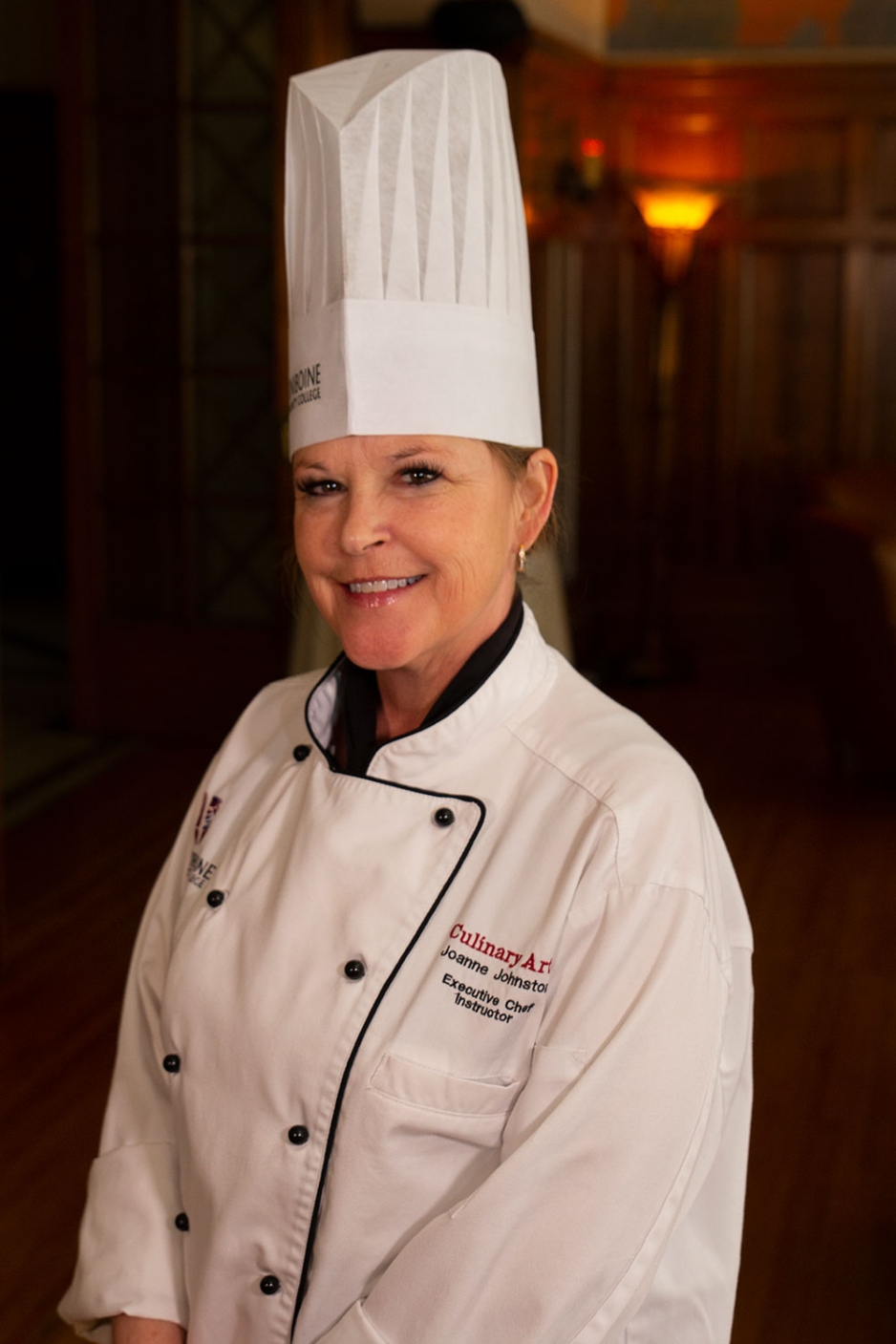
Chef Joanne Johnston, Culinary and Patisserie Arts Instructor at the Manitoba Institute of Culinary Arts of Assiniboine in Brandon, MB received her baking certificate from Red River Community Colleges in Winnipeg, MB followed by her Red Seal cooking certification with Manitoba Apprenticeship. Joanne’s career as a culinary educator spans over two decades in the Province of Manitoba. She spent nine years as a vocational culinary teacher at Swan Valley Regional Secondary School before joining the college. Joanne has been instructing at Assiniboine for 19 years, where she instructs patisserie and cooking principles to post-secondary learners.
Chef Johnston actively promotes sustainability through her teaching and enjoys interacting with the Horticultural & Sustainable Foods programs at Assiniboine to develop and grow local products that are used by her students in the teaching kitchen for curriculum and public events. Joanne continually strives to strengthen her skills by participating in patisserie specialty courses across North America with world-class patisserie chefs. She enjoys sharing her skills with her students and challenging them to move to the "next level" in the teaching kitchen.
Outside of the teaching kitchen, Joanne enjoys interest in painting, gardening and fishing.
Trevor Atamanchuk RSE
Instructor, Culinary Arts
[email protected]
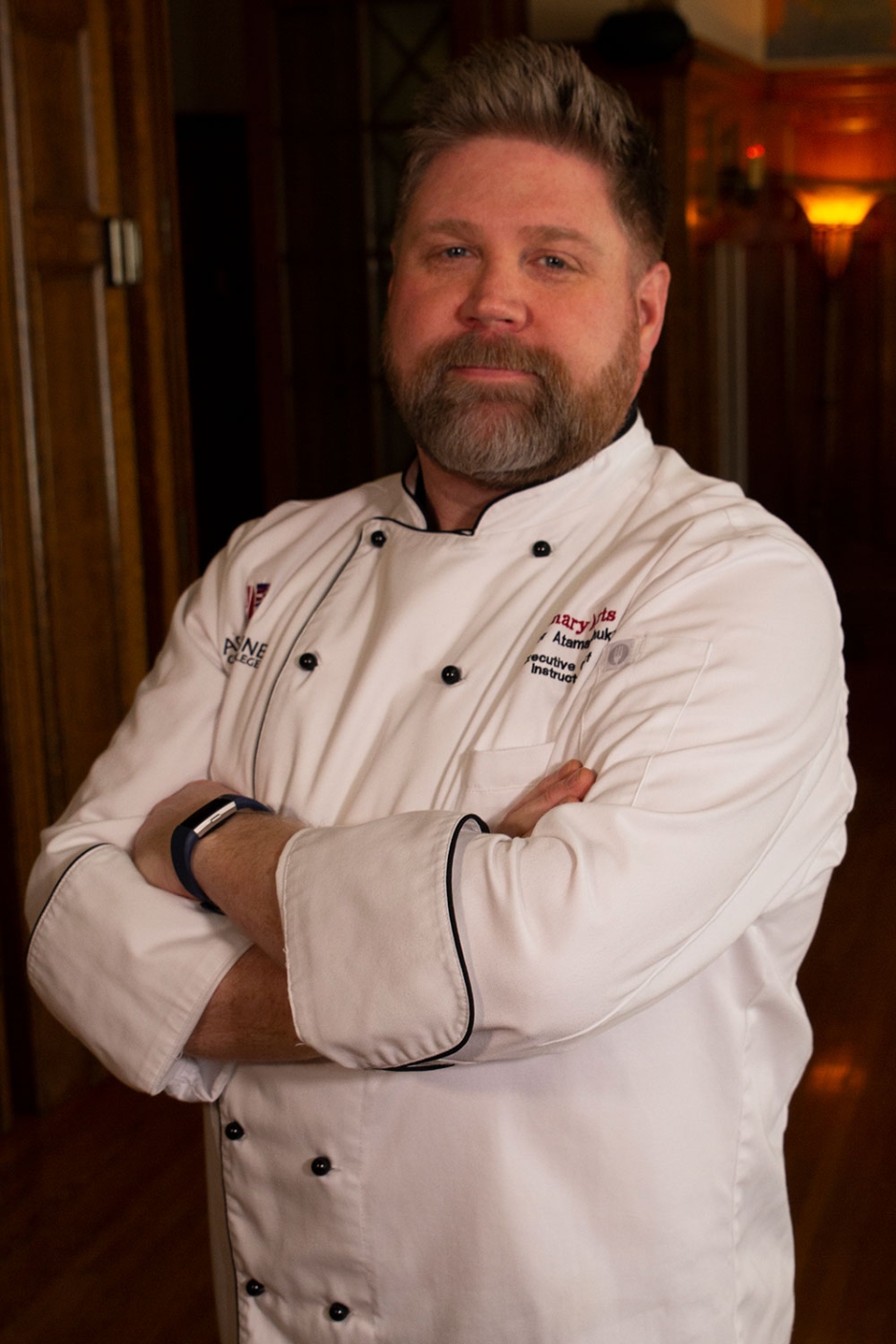
Graduating from the very first professional cooking program offered at Assiniboine back in 96’-97’ lead to a prestige 15-year career with Fairmont Hotel & Resorts. Trevor attained his Journeyman-Red Seal cooks' certificate from SAIT (Southern Alberta Institute of Technology – Calgary), while cooking through the ranks at the Banff Springs Hotel. Promotions also took him to Chateau Lake Louise and Scottsdale Arizona, holding positions as Banquet Chef, Restaurant Chef and Chef de Cuisine. He was also an Executive Sous Chef in Winnipeg and Executive Chef in Kelowna, BC. His culinary adventures lead him back to Calgary to an Executive Chef position at the Palace Theatre by Concorde Entertainment Group, and then as Banquet Chef at Calgary Sports & Entertainment Corporation (Calgary Flames Saddledome).
Returning back to his hometown, Trevor joined Assiniboine as a Culinary Instructor with MICA. Chef Atamanchuk notes, “I believe that not only do I have a passion for food, I have the desire and drive to be creative, to inspire the next generation of Culinary Students, and to look forward giving back to my community in the most adventurous way…through food! Never trust a skinny Chef!”

